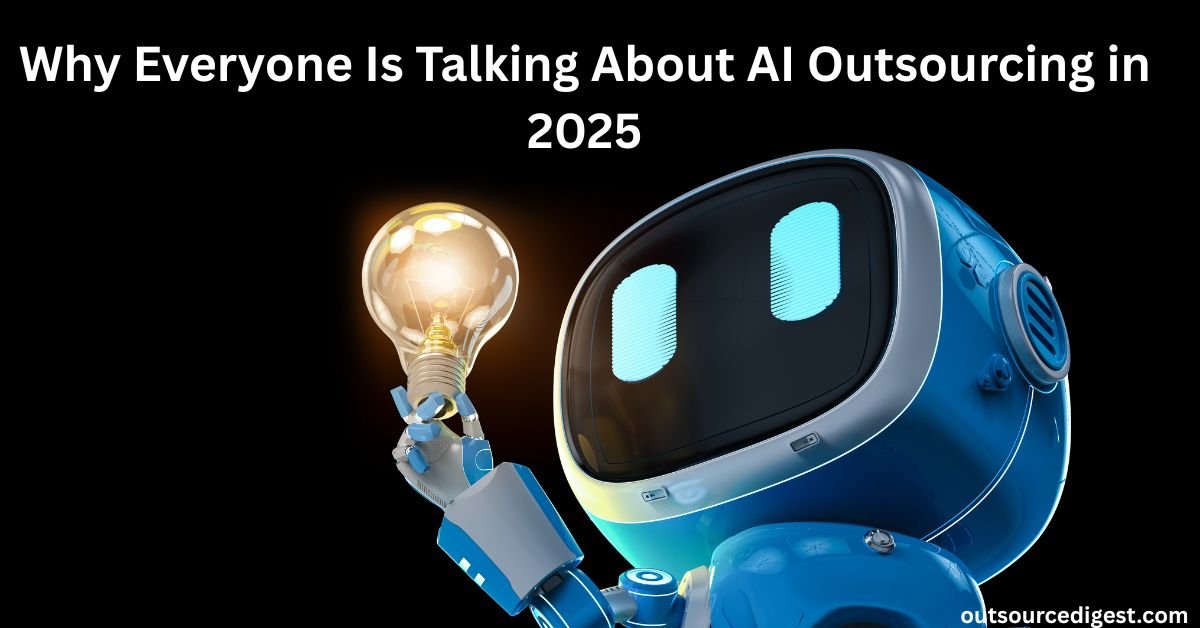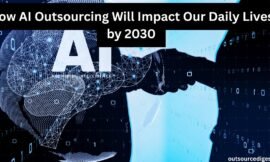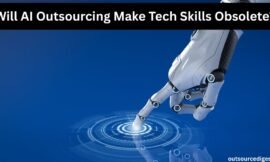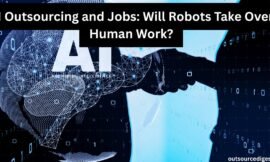In 2025, AI outsourcing has become more than just a business strategy—it’s a global trend that everyone is buzzing about. Whether you’re a student, freelancer, content creator, or business owner, you’ve probably noticed how artificial intelligence is shaping the way people work, learn, and even create.
But why is it suddenly everywhere? Why are media outlets, businesses, and even everyday people talking nonstop about outsourcing AI tasks?
This guide explores the key reasons behind the trend, the opportunities it creates, and the challenges it raises. By the end, you’ll understand why AI outsourcing is no longer limited to tech giants and why it matters to you in 2025.
What Is AI Outsourcing?
At its core, AI outsourcing means delegating artificial intelligence development, implementation, or support to an external provider. Instead of building AI tools in-house, companies and individuals rely on specialized vendors, freelancers, or platforms.
Examples include:
- A startup is hiring an offshore AI development company to build a chatbot.
- A small business using outsourced AI-powered marketing tools.
- A freelancer selling AI-generated content or images through marketplaces.
The idea is simple: let someone else handle the complex AI side while you focus on results.
Why AI Outsourcing Is Trending in 2025
So, what makes 2025 the breakout year for AI outsourcing? A mix of economic, technological, and cultural shifts.
- Cost Savings That Everyone Understands
Building AI in-house is expensive—data, engineers, infrastructure. Outsourcing makes it accessible for startups, students, and even small creators. With subscription-based AI services, you can do in days what used to take months of development.
- Faster Innovation for All
Thanks to outsourcing, you don’t need to be a coder to launch an AI-powered app, website, or service. Pre-built AI tools and outsourced teams mean faster time-to-market, which is a huge reason for the hype.
- Freelancers Turning Into AI Providers
Instead of just offering design or writing, many freelancers now sell AI-driven services—like automated copywriting, predictive analytics, or AI-powered SEO. This shift is fueling conversations across the gig economy.
- AI in Everyday Life
It’s not just businesses. Students use AI tutoring platforms, creators outsource video editing to AI tools, and gamers test outsourced AI engines to enhance gameplay. The conversation has moved from boardrooms to living rooms.
AI Outsourcing and Jobs
One of the biggest reasons people talk about AI outsourcing in 2025 is its impact on jobs.
New Opportunities
- AI project managers to coordinate outsourced teams.
- AI consultants who advise companies on choosing the right vendors.
- AI tool operators—ordinary people learning how to prompt and manage outsourced AI.
Job Shifts and Concerns
Of course, there’s fear. If businesses outsource too much AI, traditional roles like junior developers or writers might shrink. But history shows outsourcing often shifts—not eliminates—jobs.
For a deeper look, see: AI Outsourcing and Jobs: Will Robots Take Over Human Work?
AI Outsourcing for Everyone (Not Just Companies)
In 2025, the buzz isn’t just about corporations—it’s about how AI outsourcing touches everyday people.
Students: Instead of hiring tutors, many students use outsourced AI tools for exam prep, essays, or learning new skills at a fraction of the cost.
Content Creators: Outsourced AI platforms handle editing, thumbnail design, and even script generation, giving creators more time to focus on strategy and engagement.
Small Businesses: Local shops use outsourced AI to automate social media, customer support, and even bookkeeping. They get big-company advantages without the budget.
Gamers and Developers: Gamers are outsourcing AI-generated assets, maps, and character designs, while indie developers speed up game creation with outsourced AI tools.
This democratization of AI is exactly why everyone is talking about it—it’s no longer a luxury.
The Risks People Are Talking About
No trend comes without concerns, and AI outsourcing sparks plenty of debate in 2025.
Privacy Issues: When outsourcing AI tasks, sensitive data often passes through third-party providers. Who owns it? Who protects it? These questions are top of mind.
Quality Control: AI isn’t perfect. Outsourcing to the wrong vendor can mean inaccurate results, biased models, or generic content. That’s why due diligence is crucial.
Overreliance on AI: Some worry people are outsourcing too much to machines—losing critical thinking, creativity, or even job readiness.
The Future of AI Outsourcing (2026 and Beyond)
Looking ahead, it’s clear that AI outsourcing won’t slow down. Instead, expect:
- More regulation around data privacy and AI ethics.
- Specialized outsourcing hubs in countries leading AI adoption.
- Personal AI outsourcing, where individuals outsource tasks like health tracking, shopping, or financial planning to AI-driven platforms.
By 2030, experts predict AI outsourcing will feel as normal as using cloud storage today.
Conclusion
So, why is everyone talking about AI outsourcing in 2025?
- It’s affordable and accessible.
- It’s fueling innovation across industries.
- It’s reshaping jobs, education, and even hobbies.
- It’s raising real questions about privacy, quality, and dependence on technology.
Whether you’re a business leader, freelancer, or just curious about the future, AI outsourcing is already part of your world. And in 2025, ignoring it is no longer an option.





